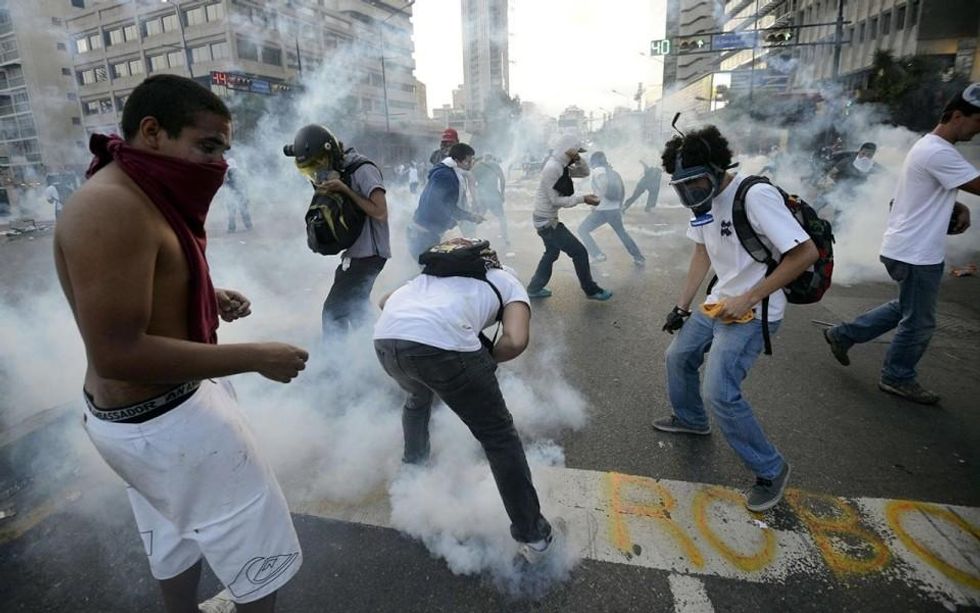

SUBSCRIBE TO OUR FREE NEWSLETTER
Daily news & progressive opinion—funded by the people, not the corporations—delivered straight to your inbox.
5
#000000
#FFFFFF
To donate by check, phone, or other method, see our More Ways to Give page.


Daily news & progressive opinion—funded by the people, not the corporations—delivered straight to your inbox.

Headlines in the United States broadcast unchallenged narratives of widespread discontent with mounting economic woes and denounce the ensuing repression by an unpopular and discredited administration barely clinging to power. But the reality in Venezuela is far more complicated and nuanced than what the media and the U.S. government spin suggests.
For instance, it is difficult to say who is responsible for provoking the conflict. Despite the uncertainty over who is inciting the violence, the U.S. government and press largely condemn President Nicolas Maduro's administration while framing the protests as popular revolution, in some cases tacitly or even overtly rooting for regime change.
America's unfettered leverage
The United States' disenchantment with Venezuelan politics in the last 15 years is no secret. The U.S. has a sordid history of exerting unfettered influence in Latin America. It has supported the ouster of democratically elected governments and backed strongmen whose policies advance U.S. economic and political interests, inflicting incalculable suffering on the most vulnerable citizens of those countries.
Read the rest of this article on Al-Jazeera America.
Dear Common Dreams reader, The U.S. is on a fast track to authoritarianism like nothing I've ever seen. Meanwhile, corporate news outlets are utterly capitulating to Trump, twisting their coverage to avoid drawing his ire while lining up to stuff cash in his pockets. That's why I believe that Common Dreams is doing the best and most consequential reporting that we've ever done. Our small but mighty team is a progressive reporting powerhouse, covering the news every day that the corporate media never will. Our mission has always been simple: To inform. To inspire. And to ignite change for the common good. Now here's the key piece that I want all our readers to understand: None of this would be possible without your financial support. That's not just some fundraising cliche. It's the absolute and literal truth. We don't accept corporate advertising and never will. We don't have a paywall because we don't think people should be blocked from critical news based on their ability to pay. Everything we do is funded by the donations of readers like you. Will you donate now to help power the nonprofit, independent reporting of Common Dreams? Thank you for being a vital member of our community. Together, we can keep independent journalism alive when it’s needed most. - Craig Brown, Co-founder |

Headlines in the United States broadcast unchallenged narratives of widespread discontent with mounting economic woes and denounce the ensuing repression by an unpopular and discredited administration barely clinging to power. But the reality in Venezuela is far more complicated and nuanced than what the media and the U.S. government spin suggests.
For instance, it is difficult to say who is responsible for provoking the conflict. Despite the uncertainty over who is inciting the violence, the U.S. government and press largely condemn President Nicolas Maduro's administration while framing the protests as popular revolution, in some cases tacitly or even overtly rooting for regime change.
America's unfettered leverage
The United States' disenchantment with Venezuelan politics in the last 15 years is no secret. The U.S. has a sordid history of exerting unfettered influence in Latin America. It has supported the ouster of democratically elected governments and backed strongmen whose policies advance U.S. economic and political interests, inflicting incalculable suffering on the most vulnerable citizens of those countries.
Read the rest of this article on Al-Jazeera America.

Headlines in the United States broadcast unchallenged narratives of widespread discontent with mounting economic woes and denounce the ensuing repression by an unpopular and discredited administration barely clinging to power. But the reality in Venezuela is far more complicated and nuanced than what the media and the U.S. government spin suggests.
For instance, it is difficult to say who is responsible for provoking the conflict. Despite the uncertainty over who is inciting the violence, the U.S. government and press largely condemn President Nicolas Maduro's administration while framing the protests as popular revolution, in some cases tacitly or even overtly rooting for regime change.
America's unfettered leverage
The United States' disenchantment with Venezuelan politics in the last 15 years is no secret. The U.S. has a sordid history of exerting unfettered influence in Latin America. It has supported the ouster of democratically elected governments and backed strongmen whose policies advance U.S. economic and political interests, inflicting incalculable suffering on the most vulnerable citizens of those countries.
Read the rest of this article on Al-Jazeera America.